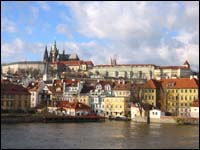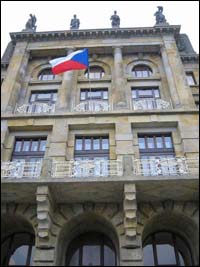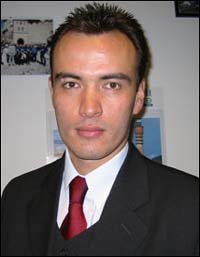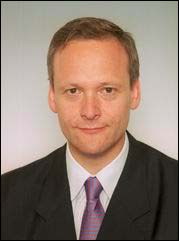 AT THE
HEART OF EUROPE AT THE
HEART OF EUROPE |

Located at the heart of Europe, the Czech republic
is the geographic and economic link between eastern
and western Europe. This country is also at the
heart of the EU accession, its final entrance being
planned for 2004. And to keep the metaphor, the
Czechs just said good-bye to the 'president of their
heart', Václav Havel, who had been at the
head of the country for 13 years. During the years
of his presidency, the Czech Republic has undergone
a rapid and often turbulent transformation, becoming
one of the top destinations for investment in Central
Europe. What makes the country so attractive, what
are currently the hot opportunities and what you
should look at when planning a Central European
expansion?
The Czech Republic was born in 1918 at the end of
World War 1, taking the historical Czech lands out
of the Austro-Hungarian empire. The skilled workforce
and the enthusiastic society turned the young country
into one of the main European industrial strongholds
in the first third of the 20th century. The promising
developments were cut short by the Nazi aggression
in 1938 and the subsequent 50 years of communism.
However, once the country was set free in 1989,
it has managed to transform its economy and once
again build a strong and growing economy. The first
official confirmation that the Czech Republic is
on the right track came when the country was - together
with Hungary and Poland - invited to join NATO in
1999. With further economic progress and legislation
implementing EU rules, the European Union was the
next target, successfully achieved in 2002 and full
entry planned as soon as in May 1, 2004.

As in other transforming countries, not all went
as planned but the economy remained rather strong
and the progressively improving legal system has
added stability to the country. Its central position
between East and West - confirmed by the NATO summit
held in Prague in November 2002 - has turned the
Czech Republic into an attractive place for many
foreign companies that enjoy operating in a stable
country with highly skilled workforce and appealing
investment incentives. "Indeed, the stable
economic and social environment in the Czech Republic
compared with many other countries has been highly
attractive to many international companies,"
confirms Mr.
Vladimir Špidla, the Czech Prime Minister
and the Chairman of the ruling Social Democratic
Party
 . .
While the first investors came primarily from neighboring
Germany and Austria or from the United States, the
last two years have seen a strong influx of French
companies that have become strong players in the
finance sector, across various industries as well
as in utilities. ''France is one of the biggest
countries of Europe, and if the French decided to
come and invest here, that means that they showed
to everyone that we can trust our system; that it
is worth investing in the Czech Republic. |
This will ease our entrance
into the European Union'', says Mr.
Robert Nechyba, General Manager of OTEC International,

a French transport and logistics company successfully
operating in the Czech Republic.
Stable and attractive investment environment has
always been high on the agenda of Czech governments.
The country manages to keep inflation very low and
even though deficits have been growing in the last
several years, the pressure for public finance reform
is growing to avoid economic problems that would
threaten the open Czech economy and its growth.
So far, the Czech economy remained strong compared
to the EU. "The Czech Republic had a faster
growth than the rest of Europe during the past two
years," points out Mr.
Špidla ,predicting that economic growth
of around 2,5% will be also maintained during the
next two years. "The GDP growth of course strongly
depends on the state of other European economies
as the Czech Republic exports almost 70% of its
production to the EU countries," Mr.
Eduard Janota, First Deputy Minister of Finance

points out. The percentage is set to grow as about
15% of exports go to the CEFTA countries, most of
which are set to join the EU together with the Czech
Republic. "85% of exports going to the EU are
the absolute maximum and the Czech Republic will
have to look more closely at other traditional export
markets - Russia, Middle East and the Balkans,"
points out Mr.
Jirí Rusnok, Minister of Industry and
Trade. "This gives us the possibility to get
closer to the eastern countries, which are still
behind us and which will most probably enters the
EU one day. Prague and the Czech Republic are really
at the centre of Europe, and today a lot of companies
already use Prague as a central platform towards
eastern countries', says
Mr. Nechyba of OTEC International.
The growing deficit is the major issue the current
government must deal with. The deficit is currently
almost 6% of the GDP while the Maastricht criteria
call for only 3%. On the other hand, there is still
room in the public debt that is about 30% of GDP,
i.e. about half of the 60% threshold set in the
same rules. The current coalition government is
trying to prepare a budget reform, however, as it
is dominated by spending-prone social democrats
and has only a single vote majority in the parliament,
the reform might be slow to take off and the debt
might worsen quickly. 'The public finance deficit
and of the GDP is around 6%. We are currently working
on a public budget reform, which should reduce this
deficit to 4% in 2006', says the Minister
of Finance, Mr. Bohuslav Sobotka.
Mr. Janota remains optimistic, saying "The
current government wants to stabilize the budget
by 2006, when the annual deficit should be under
5% of GDP."
As the Czech Republic closed its negotiations with
the European Union and prepares for the referendum
on the membership, international cooperation on
all levels is in the spotlight on all levels. After
the turmoil in the Czech-German relations in the
early 90's, the situation was stabilized in a joint
Czech-German declaration and Germany has become
the strongest trade and investment partner of the
Czech Republic. Relations with Austria, recently
upset over the nuclear power plant in Temelin have
been settled during the EU talks and the Czech Republic
enjoys a strong and stable relationship with its
two other neighbors, Slovakia and Poland.
Looking further west, France has become a strong
partner for the Czech Republic, both on the political
and business levels. "We have frequent and
excellent relations with France and welcome all
the French investors. France also plays a very important
role in the EU enlargement process and I believe
that we will have good relations with the new government
in France," says Mr.
Cyril Svoboda, Minister of Foreign Affairs.
 |

